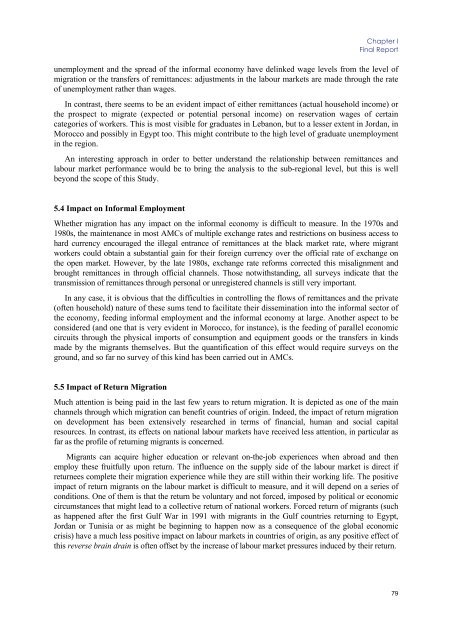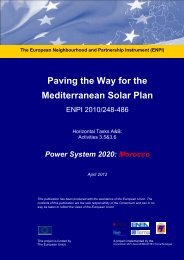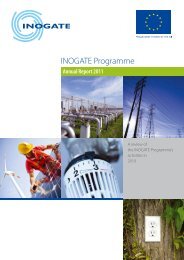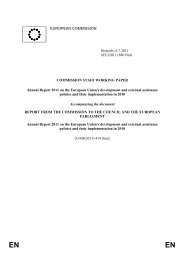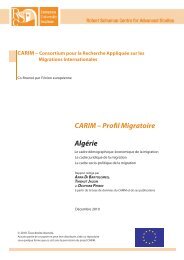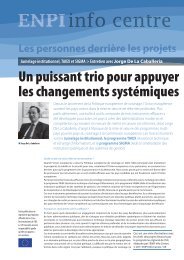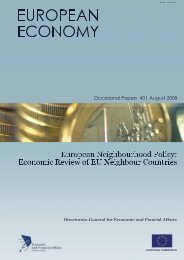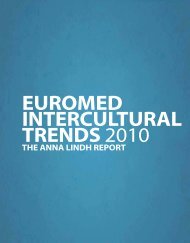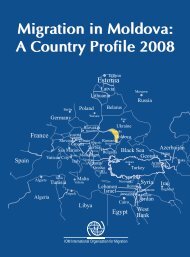<strong>European</strong> CommissionOccasional Paper 60, Volume IPalestinians “Circular Migration” to Israel:A Test Case for the Impact of Remittances on the EconomyA very special <strong>and</strong> unique case, but at the same time a very interesting case-study of circular (daily)<strong>migration</strong> <strong>and</strong> for the impact of <strong>migration</strong> on labour <strong>market</strong>s in countries of origin, is the case ofPalestinian workers in Israel between the late 1970s <strong>and</strong> the late 1990s. Until the outbreak of thesecond intifada in year 2000, the main source of employment for the Palestinian labour force was theIsraeli labour <strong>market</strong>, where they engaged in daily commuting to <strong>and</strong> from Israel to work mainly inthe construction <strong>and</strong> agriculture sectors <strong>and</strong> where they could typically earn an average of 26€ a day,for 14€ a day in the local Palestinian labour <strong>market</strong>. In 1999, the number of Palestinian workers inIsrael reached 114.000, more than 20% of the labour force (150.000 according to other sources), <strong>and</strong>remittances received by Palestine amounted to close to 1bn US$ a year.In 2000, an important proportion of those workers lost their jobs <strong>and</strong> their ability to move freely <strong>and</strong> tocontinue enjoying legal work in Israel <strong>and</strong> so the rights of compensation <strong>and</strong> other allowances. This gaverise to i) more ‘irregular’ employment in Israel where workers had no special Israeli permits for work,although this phenomenon has too started to decline since Israel started building the Expansion <strong>and</strong>Annexation Wall, ii) a steep increase in unemployment in the Palestinian Territories (in particular in theGaza Strip, where the ban to cross to Israel to work has been total), iii) an increase in poverty rate <strong>and</strong> acollapse of dem<strong>and</strong> in the Palestinian Territories, with an indirect effect on production <strong>and</strong> economicactivity, iv) an extension of the informal economy, including of women, to make up for this loss ofemployment <strong>and</strong> income, v) an increase in public sector employment, particularly in the Gaza Strip, vi) anincrease in the engagement of women in economic activities, often in the informal sector.By 2008, the number of Palestinians working in Israel has been reduced to 74.000, 30.000 of themfrom Jerusalem (who are subject to less strict regulations than PT Palestinians allowing them to work <strong>and</strong>move freely in Israel). Remittances have stabilized at around 600 million US$ a year, a 30% decrease inrelation to the peak year of 1999.The estimated losses of Palestinian labour due to the closure of the Israeli labour <strong>market</strong> during thefirst 27 months of the second intifada was 1.3 billion US$, in addition to 28 billion US$ of workcompensation for Palestinian workers in Israel. The latter figure represented more than 50% of PalestinianGDP before the outbreak of the intifada (PCBS, 2005. Palestinian <strong>Labour</strong> Force in Israel <strong>and</strong> Settlements(1995-2003). Ramallah-Palestine).National Background Paper on PalestineMustapha Khawaja <strong>and</strong> Mohammad Omari (2009)However, high level of remittances as a factor in explaining the low labour participation rates ofwomen in AMCs is far from proven. Female labour participation rates are lower throughout AMCs,regardless of the level of remittances these countries receive, <strong>and</strong> they are much lower in AMCs thanin other developing countries with similar levels of remittances. So this points rather to cultural factorsas the key to low female participation. Jordan supports this point. Most economically-active women inJordan come from mid-to-high socio-economic backgrounds <strong>and</strong> have high educational attainment. Itis among less educated women from poorer socio-economic backgrounds that economic activity ratesare extremely low. Importantly, remittances in Jordan accrue mostly to prosperous households withhigh educational attainment (World Bank 2007). This suggests that remittances are not a major factorin decreasing Jordanian women’s labour <strong>market</strong> participation.Average wages do not seem to be affected by remittances either; they seem to be determined by thelegal minimum wage on one side of the spectrum (with informal sector wages under the minimumwage) <strong>and</strong> by public sector wages on the other (see Section 2.3). The high prevalence of78
Chapter IFinal Reportunemployment <strong>and</strong> the spread of the informal economy have delinked wage levels from the level of<strong>migration</strong> or the transfers of remittances: adjustments in the labour <strong>market</strong>s are made through the rateof unemployment rather than wages.In contrast, there seems to be an evident impact of either remittances (actual household income) orthe prospect to migrate (expected or potential personal income) on reservation wages of certaincategories of workers. This is most visible for graduates in Lebanon, but to a lesser extent in Jordan, inMorocco <strong>and</strong> possibly in Egypt too. This might contribute to the high level of graduate unemploymentin the region.An interesting approach in order to better underst<strong>and</strong> the relationship between remittances <strong>and</strong>labour <strong>market</strong> <strong>performance</strong> would be to bring the analysis to the sub-regional level, but this is wellbeyond the scope of this Study.5.4 Impact on Informal EmploymentWhether <strong>migration</strong> has any impact on the informal economy is difficult to measure. In the 1970s <strong>and</strong>1980s, the maintenance in most AMCs of multiple exchange rates <strong>and</strong> restrictions on business access tohard currency encouraged the illegal entrance of remittances at the black <strong>market</strong> rate, where migrantworkers could obtain a substantial gain for their foreign currency over the official rate of exchange onthe open <strong>market</strong>. However, by the late 1980s, exchange rate reforms corrected this misalignment <strong>and</strong>brought remittances in through official channels. Those notwithst<strong>and</strong>ing, all surveys indicate that thetransmission of remittances through personal or unregistered channels is still very important.In any case, it is obvious that the difficulties in controlling the <strong>flows</strong> of remittances <strong>and</strong> the private(often household) nature of these sums tend to facilitate their dissemination into the informal sector ofthe economy, feeding informal employment <strong>and</strong> the informal economy at large. Another aspect to beconsidered (<strong>and</strong> one that is very evident in Morocco, for instance), is the feeding of parallel economiccircuits through the physical imports of consumption <strong>and</strong> equipment goods or the transfers in kindsmade by the migrants themselves. But the quantification of this effect would require surveys on theground, <strong>and</strong> so far no survey of this kind has been carried out in AMCs.5.5 Impact of Return MigrationMuch attention is being paid in the last few years to return <strong>migration</strong>. It is depicted as one of the mainchannels through which <strong>migration</strong> can benefit countries of origin. Indeed, the impact of return <strong>migration</strong>on development has been extensively researched in terms of financial, human <strong>and</strong> social capitalresources. In contrast, its effects on national labour <strong>market</strong>s have received less attention, in particular asfar as the profile of returning migrants is concerned.Migrants can acquire higher education or relevant on-the-job experiences when abroad <strong>and</strong> thenemploy these fruitfully upon return. The influence on the supply side of the labour <strong>market</strong> is direct ifreturnees complete their <strong>migration</strong> experience while they are still within their working life. The positiveimpact of return migrants on the labour <strong>market</strong> is difficult to measure, <strong>and</strong> it will depend on a series ofconditions. One of them is that the return be voluntary <strong>and</strong> not forced, imposed by political or economiccircumstances that might lead to a collective return of national workers. Forced return of migrants (suchas happened after the first Gulf War in 1991 with migrants in the Gulf countries returning to Egypt,Jordan or Tunisia or as might be beginning to happen now as a consequence of the global economiccrisis) have a much less positive impact on labour <strong>market</strong>s in countries of origin, as any positive effect ofthis reverse brain drain is often offset by the increase of labour <strong>market</strong> pressures induced by their return.79
- Page 5 and 6:
STUDYLABOUR MARKETS PERFORMANCE AND
- Page 7 and 8:
Table of ContentsLABOUR MARKETS PER
- Page 10:
8.1 Actual migration and consumptio
- Page 15 and 16:
Chapter IFinal Report 15 MILLION NE
- Page 17 and 18:
Chapter IFinal Report …so that MI
- Page 19 and 20:
Chapter IFinal Reportroots). The cu
- Page 21 and 22:
Chapter IFinal Report In AMCs, REMI
- Page 23 and 24:
Chapter IFinal Reportpolicies. This
- Page 25 and 26:
Chapter IFinal ReportMediterranean
- Page 27 and 28:
Chapter IFinal ReportMore recently,
- Page 29 and 30: Chapter IFinal Reportfor EU employm
- Page 31 and 32: Chapter IFinal Reportchosen, these
- Page 33 and 34: Chapter IFinal Reportexit of women
- Page 35 and 36: Chapter IFinal ReportFigure 1.2.1.
- Page 37 and 38: Chapter IFinal ReportA Declining Em
- Page 39 and 40: Chapter IFinal ReportThe same year,
- Page 41 and 42: Chapter IFinal ReportTable 2.2.1. I
- Page 43 and 44: Chapter IFinal Reportminimum wages
- Page 45 and 46: Chapter IFinal Report2.4 Unemployme
- Page 47 and 48: Chapter IFinal ReportYouth Unemploy
- Page 49 and 50: Chapter IFinal ReportBut one should
- Page 51 and 52: Chapter IFinal Reportmillion) 10 .
- Page 53 and 54: Chapter IFinal Reportmight intensif
- Page 55 and 56: Chapter IFinal Reporttrue labour ma
- Page 57 and 58: Chapter IFinal Reportto reform the
- Page 59 and 60: Chapter IFinal ReportFrom a differe
- Page 61 and 62: Chapter IFinal ReportTable 4.2.1 Ou
- Page 63 and 64: Chapter IFinal ReportSource: Adams
- Page 65 and 66: Chapter IFinal Reportin the destina
- Page 67 and 68: Chapter IFinal ReportIn conclusion,
- Page 69 and 70: Chapter IFinal Reportorganised in B
- Page 71 and 72: Chapter IFinal Reportsecond Intifad
- Page 73 and 74: Chapter IFinal Reportstands at 29.7
- Page 75 and 76: Chapter IFinal Reportconstruction w
- Page 77 and 78: Chapter IFinal ReportAs far as the
- Page 79: Chapter IFinal Reportother cases, l
- Page 83 and 84: Chapter IFinal Reportof Egypt, so f
- Page 85 and 86: Chapter IFinal ReportWhile progress
- Page 87 and 88: Chapter IFinal ReportThese reservat
- Page 89 and 90: Chapter IFinal ReportAs Figure 6.3.
- Page 91 and 92: Chapter IFinal Reportin skill devel
- Page 93 and 94: Chapter IFinal ReportThe Directive
- Page 95 and 96: Chapter IFinal ReportThe need for
- Page 97 and 98: Chapter IFinal Reportobjectives are
- Page 99 and 100: Chapter IFinal Reporttrue Euro-Medi
- Page 101 and 102: Chapter IFinal Report- Putting empl
- Page 103 and 104: Chapter IFinal Report promotion of
- Page 105 and 106: Chapter IFinal ReportOtherADAMS, R.
- Page 107 and 108: Chapter IFinal ReportDE BEL-AIR, F.
- Page 109 and 110: Chapter IFinal ReportGUPTA, S., C.
- Page 111 and 112: Chapter IFinal ReportOECD (2000): M
- Page 113 and 114: Chapter II - Thematic Background Pa
- Page 115 and 116: Chapter IIThe impact of migration o
- Page 117 and 118: Chapter IIThe impact of migration o
- Page 119 and 120: Chapter IIThe impact of migration o
- Page 121 and 122: Chapter IIThe impact of migration o
- Page 123 and 124: Chapter IIThe impact of migration o
- Page 125 and 126: Chapter IIThe impact of migration o
- Page 127 and 128: Chapter IIThe impact of migration o
- Page 129 and 130: Chapter IIThe impact of migration o
- Page 131 and 132:
Chapter IIThe impact of migration o
- Page 133 and 134:
Chapter IIThe impact of migration o
- Page 135 and 136:
Chapter IIThe impact of migration o
- Page 137 and 138:
Chapter IIThe impact of migration o
- Page 139 and 140:
Chapter IIThe impact of migration o
- Page 141 and 142:
Chapter IIThe impact of migration o
- Page 143 and 144:
Chapter IIThe impact of migration o
- Page 145 and 146:
Chapter IIThe impact of migration o
- Page 147 and 148:
Chapter IIThe impact of migration o
- Page 149 and 150:
Chapter IIThe impact of migration o
- Page 151 and 152:
Chapter IIThe impact of migration o
- Page 153 and 154:
Chapter IIThe impact of migration o
- Page 155 and 156:
Chapter IIThe impact of migration o
- Page 157 and 158:
Chapter IIThe impact of migration o
- Page 159 and 160:
Chapter IIThe impact of migration o
- Page 161 and 162:
Chapter III - Thematic Background P
- Page 163 and 164:
Chapter IIIEU Migration Policy towa
- Page 165 and 166:
Chapter IIIEU Migration Policy towa
- Page 167 and 168:
Chapter IIIEU Migration Policy towa
- Page 169 and 170:
Chapter IIIEU Migration Policy towa
- Page 171 and 172:
Chapter IIIEU Migration Policy towa
- Page 173 and 174:
Chapter IIIEU Migration Policy towa
- Page 175 and 176:
Chapter IIIEU Migration Policy towa
- Page 177 and 178:
Chapter IIIEU Migration Policy towa
- Page 179 and 180:
Chapter IIIEU Migration Policy towa
- Page 181 and 182:
Chapter IIIEU Migration Policy towa
- Page 183 and 184:
Chapter IIIEU Migration Policy towa
- Page 185 and 186:
Chapter IIIEU Migration Policy towa
- Page 187 and 188:
Chapter IIIEU Migration Policy towa
- Page 189 and 190:
Chapter IIIEU Migration Policy towa
- Page 191 and 192:
Chapter IIIEU Migration Policy towa
- Page 193 and 194:
Chapter IIIEU Migration Policy towa
- Page 195 and 196:
Chapter IIIEU Migration Policy towa
- Page 197 and 198:
Chapter IIIEU Migration Policy towa
- Page 199 and 200:
Chapter IIIEU Migration Policy towa
- Page 201 and 202:
Chapter IIIEU Migration Policy towa
- Page 203 and 204:
Chapter IIIEU Migration Policy towa
- Page 205 and 206:
Chapter IIIEU Migration Policy towa
- Page 207:
Chapter IIIEU Migration Policy towa


